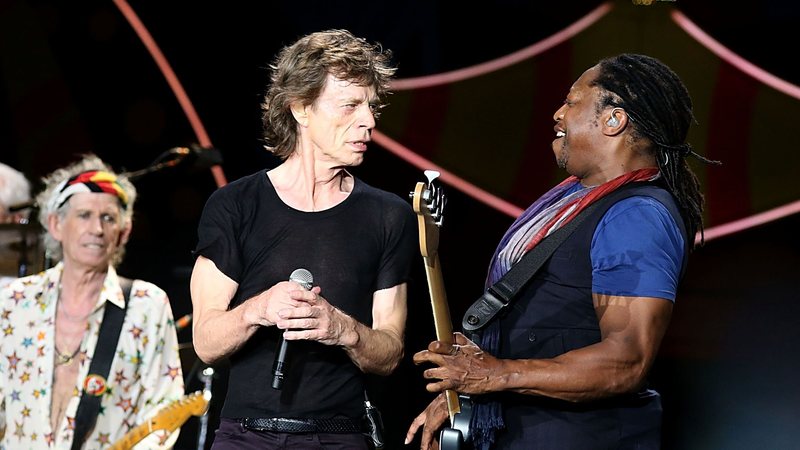Veterano joined the band in the 90s, and has since recorded albums and toured, but not as an official member.
Darryl Jones occupied the vacancy left by Bill Wyman us Rolling Stones in 1993 and hasn’t come out since. The bassist participates in tours and most studio recordings. He is not an official member of the group — which today continues as a trio after the death of the drummer Charlie Watts —, but his experience alongside Mick Jagger, Keith Richards and company is unique.
To the magazine Bass Player (via Ultimate Guitar), Jones reflected on the peculiarities of working with Stones in studio. The creative process of Jagger and Richards is very specific, especially from the guitarist, who straight away told the Darryl how it all works.
The bassist says:
The first thing that happens is that Mick and Keith get together and play different riffs and ideas. Keith told me once that sometimes he will play an old song on the piano, like something from Hoagy Carmichaelor a blues, and your hands fall in different places. That’s how he comes up with a song. Then Charlie came and they started adding people.”
About the bass, its function, Jones revealed that Jagger has been closer to him. The musician explained:
Recently, I’ve been discussing bass lines with Mick more than ever because he has a better idea of what he’s looking for. So we tried a lot of different things. We try a full line, we try doubling the guitar – until we have something he’s happy with.”

Keith Richards as a composer
Already with Richards, Darryl seems to have more creative freedom. At the same time, the bassist knows what to expect from the guitarist. In his words:
Keith delegate much more. He just puts the idea out there and lets you develop it in a way that’s more organic for you. The interesting thing about the compositions of Keith is that I know a little about how he plays bass, so now I have a repertoire of things that Keith would do for your bass lines, to give them those characteristics of the Keith. How, instead of playing the root note, he would play the minor third. I try to add these things to their compositions, to make them a little more ‘Stonean’.”
Relationship with Charlie Watts
As a bassist, your relationship with Charlie Watts it was special. Darryl Jones He then addressed the technical aspects of the group’s “kitchen” — such as “pocket”, an expression that designates aspects of the drum groove.
It’s a pocket of rhythm & blues, but a little looser. This took some time for me to get used to. I remember that in the beginning, sometimes when Charlie Watts I would go from section A to section B of a song, it would feel like the rhythm was starting to stretch during some parts and I would make an adjustment. But it ended in a place where I didn’t want to end. Now I solidify that, but I wouldn’t play so close together that his sound couldn’t breathe. I always had a lot of fun playing with those guys.”
Darryl Jones’ career
Bass prodigy, Darryl Jones was part of the legendary band Miles Davis in the first half of the 1980s. Together with the jazz icon, he recorded the albums Decoy (1984) and You’re Under Arrest (1985).
In 1985, he joined the first solo group of StingformerThe Policeand played on the record Dream of the Blue Turtles. Still in the 80s, it was in Journeyman (1989), from Eric Clapton.
Already with the Rolling Stones From 1993 onwards, he continued to participate in albums by big names, such as Joe Cockerin Organic (1996), and BB Kingin Deuces Wild (1997). In the 2000s, he appeared in works by Rod Stewart, Ziggy Marley, Neil Young and colleague Ronnie Wood.
Us Stonestouched Voodoo Lounge (1994), Bridges to Babylon (1997), The Bigger Bang (2005) and Blue & Lonesome (2016). He did not participate in the group’s most recent album, the acclaimed Hackney Diamonds (2023), where the bass was split between Keith Richards, Ronnie Wood and the producer Andrew Wattin addition to the guests Bill Wyman and Paul McCartney.
Collaborated: André Luiz Fernandes.
Source: Rollingstone
Earl Johnson is a music writer at Gossipify, known for his in-depth analysis and unique perspective on the industry. A graduate of USC with a degree in Music, he brings years of experience and passion to his writing. He covers the latest releases and trends, always on the lookout for the next big thing in music.








